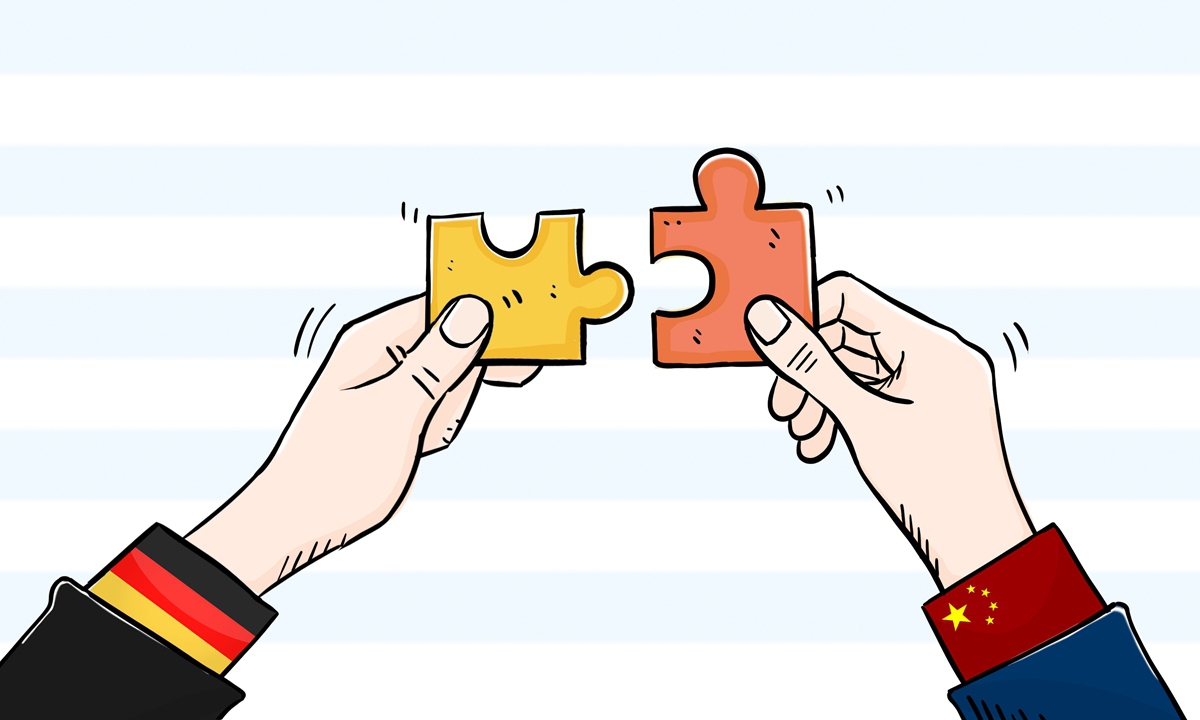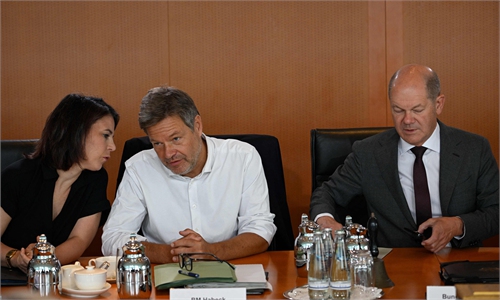Germany's wild attack on Chinese state scholarships could create obstacles for cultural exchanges

Illustration: Chen Xia/GT
German Education Minister Bettina Stark-Watzinger stated on Saturday that "China is becoming more and more competitive and is a systemic rival in the domain of science and research," citing an increased risk of so-called scientific espionage posed by Chinese students who come to study in Germany on full state scholarships, according to AFP. Additionally, the minister urged German universities to end their cooperation with China's Confucius Institutes in June to limit those institutes' influence.
These events seem to indicate a shift in Germany's attitude toward cultural exchanges with China. China and Germany have been cooperating on cultural projects ever since diplomatic ties were established last century, and things have gone fairly smoothly. These projects provide a solid foundation for comprehensive and pragmatic cooperation between China and Germany, and even China and Europe. Stark-Watzinger's remarks make us wonder: Are China's current actions really a threat to Germany's security? Or is Berlin evaluating another nation's actions based on its own standards?
In 2022, German Chancellor Olaf Scholz said that Germany is "living through a Zeitenwende," which literally means a turning point in history. It indicates that Germany is facing unprecedented major challenges. These challenges undoubtedly have led to changes in Germany's perception of the external world, including concepts of security and competition.
But more importantly, Berlin has changed its perception of China. The German federal government in June published its National Security Strategy, explicitly stating that China is both a partner and a systemic rival. This is consistent with the logic of the EU's China policy outlined in the "EU-China Strategic Outlook" in 2019. The starting point is that, as China is an important partner, complete decoupling is neither realistic nor feasible. However, China's development path differs from that of the West and involves different values. China's rise may change the Western-dominated international order. Ultimately, it is the ideology of "Western-centrism" that is at play, rooted in the logic of the Thucydides Trap.
Times are changing, but communication between peoples should not stop. The uniqueness of cultural exchanges lies in their ability to transcend national borders and cultures, facilitating communication between different groups of people. This is of great significance for building trust, dispelling doubts and achieving common development. The same applies to cultural exchanges between China and Germany. In a globalized and open world, influence has always been mutual.
In fact, Germany's major political parties have their own affiliated foundations, and the Federal Foreign Office allocates billions of euros from its cultural funds to the Alexander von Humboldt Foundation. These organizations offer scholarships to German and foreign scholars for study visits. In any case, such visits can at least give those scholars a more realistic and comprehensive understanding of the world, which is one of the positive aspects.
When I was a visiting scholar in Germany many years ago, the German inviter explicitly required that the scholars be under 35 years old. During the visit, they arranged numerous interviews, meetings and field research with politicians, business people and academics. While Germany funds Chinese scholars with a purpose, why is it applying "double standards" for China? Staying closed-minded will only display a lack of confidence and miss out on many opportunities.
Stark-Watzinger's remarks about Chinese government scholarships merely reflect her shallow understanding of China. I had the opportunity to be sponsored by the China Scholarship Council (CSC) under the Ministry of Education for studying in Tunisia in 1999. Honestly, opportunities like that were really rare back then. Due to limited domestic funds, many colleagues who went abroad for academic visits mostly had to seek funding from foreign sources. It also hindered China's exchanges with other parts of the world.
But over the years, as China's economy has grown and the government has begun to invest more money in education, more and more students and scholars have received scholarships from the CSC to study abroad. Isn't this a good phenomenon in terms of cross-cultural people-to-people exchanges? Attacks on it sound like a case of sour grapes.
Faced with China's development, Germany has realized that its institutional advantages are gradually diminishing, leading to a more complicated perception of China. This is an inevitable outcome of conflicting interests and cultural asymmetry. Germany as a core EU country and economic powerhouse should have confidence in itself. It needs to have a proper understanding of the new changes it faces and avoid falling into misconceptions, especially the trap of the "clash of civilizations" theory. It should be acknowledged that there are still positive elements in the China-Germany relationship. Therefore, it is more appropriate to continue to keep the doors of communication open. Isolating oneself and relying on subjective assumptions to make suspicious judgments will never lead to the right path.
The author is a professor at the School of International Studies at Beijing Foreign Studies University. opinion@globaltimes.com.cn



